We will stay firmly rooted in Chinese culture. We will collect and refine the defining symbols and best elements of Chinese culture and showcase them to the world. We will accelerate the development of China’s discourse and narrative systems, better tell China’s stories, make China’s voice heard, and present a China that is credible, appealing, and respectable.
习近平在重庆考察时强调:进一步全面深化改革开放
不断谱写中国式现代化重庆篇章
发布时间:2024-04-26 08:55:58 | 来源:新华网 | 作者: | 责任编辑:张芃芃习近平在重庆考察时强调
进一步全面深化改革开放
不断谱写中国式现代化重庆篇章
蔡奇陪同考察
新华社重庆4月24日电 中共中央总书记、国家主席、中央军委主席习近平近日在重庆考察时强调,重庆要对标新时代新征程党的中心任务和党中央赋予的使命,充分发挥比较优势、后发优势,进一步全面深化改革开放,主动服务和融入新发展格局,着力推动高质量发展,奋力打造新时代西部大开发重要战略支点、内陆开放综合枢纽,在发挥“三个作用”上展现更大作为,不断谱写中国式现代化重庆篇章。
4月22日至24日,习近平在中共中央政治局委员、重庆市委书记袁家军和市长胡衡华陪同下,深入物流园区、城市社区、数字化城市运行和治理中心等进行考察调研。
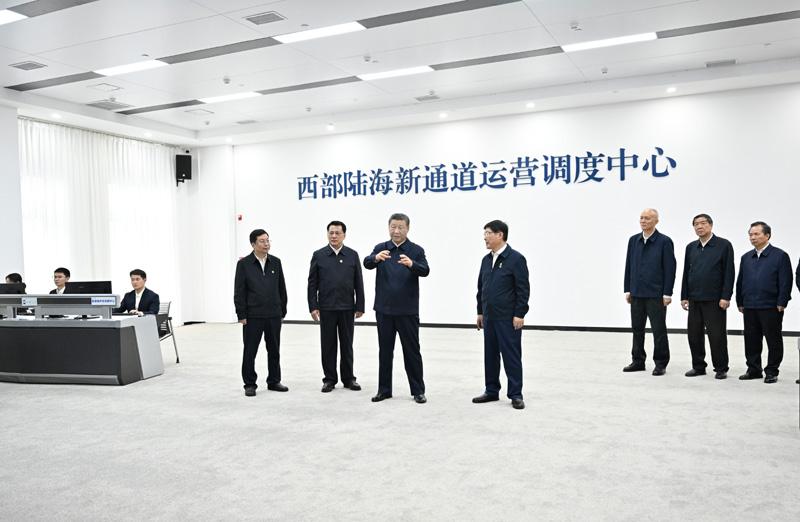
4月22日至24日,中共中央总书记、国家主席、中央军委主席习近平在重庆考察。这是22日下午,习近平在重庆国际物流枢纽园区西部陆海新通道重庆无水港运营调度中心考察。新华社记者 岳月伟 摄
22日下午,习近平首先考察了重庆国际物流枢纽园区。他来到西部陆海新通道重庆无水港运营调度中心,听取新通道建设情况汇报。习近平强调,物流是实体经济的“筋络”。建设西部陆海新通道,对于推动形成“陆海内外联动、东西双向互济”的对外开放格局具有重要意义。各有关方面要齐心协力,把这一标志性项目建设好、运营好,带动西部和内陆地区高水平对外开放。物流园区要积极运用先进技术,不断创新联运模式,提高科学管理水平,在建设现代物流体系中发挥更大作用。
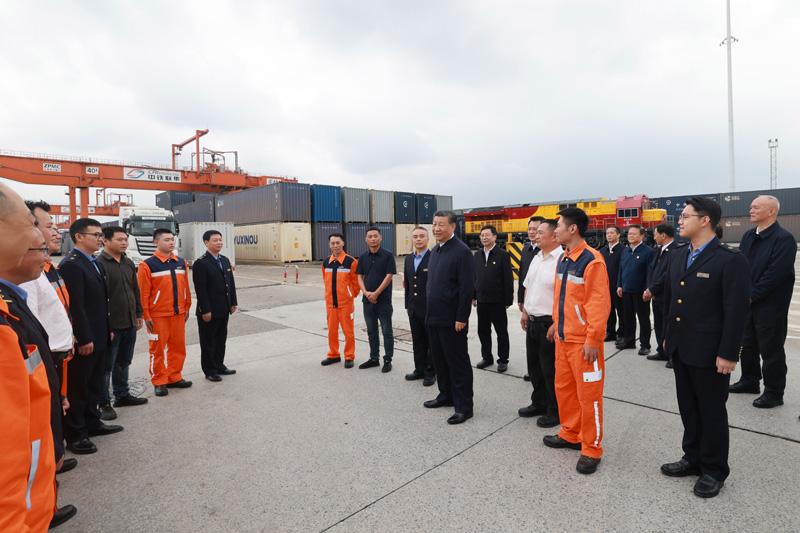
4月22日至24日,中共中央总书记、国家主席、中央军委主席习近平在重庆考察。这是22日下午,习近平在重庆国际物流枢纽园区重庆铁路集装箱中心站,同货车司机、列车司机、装卸工人、场站管理人员等亲切交流。新华社记者 王晔 摄
随后,习近平来到重庆铁路集装箱中心站,听取货物集散、运输路径、运营成本和效益等介绍,同货车司机、列车司机、装卸工人、场站管理人员等亲切交流,询问他们的工作强度、劳动保护、节假日休息和收入情况。习近平说,大家在物流一线,也是在对外开放一线,通过你们的辛勤劳动,很多商品跨越山海、走向世界,你们的工作很有意义。推动西部大开放、促进西部大开发,物流很重要,大家要继续努力,不断创造新的业绩,作出新的贡献。

4月22日至24日,中共中央总书记、国家主席、中央军委主席习近平在重庆考察。这是22日下午,习近平在重庆国际物流枢纽园区重庆铁路集装箱中心站,同货车司机、列车司机、装卸工人、场站管理人员等亲切交流。新华社记者 王晔 摄
习近平还听取了重庆推动成渝地区双城经济圈建设情况汇报,参观了重庆科技创新和产业发展成果展示。习近平表示,建设成渝地区双城经济圈是党中央作出的重大战略决策。重庆、四川两地要紧密合作,不断提升发展能级,共同唱好新时代西部“双城记”。支柱产业是发展新质生产力的主阵地。重庆的制造业有自身的结构特点、有相应的优势,希望重庆牢牢抓住科技创新这个“牛鼻子”,扬优势、补短板,抓当前、谋未来,坚定不移、久久为功,奋力推动制造业高质量发展。
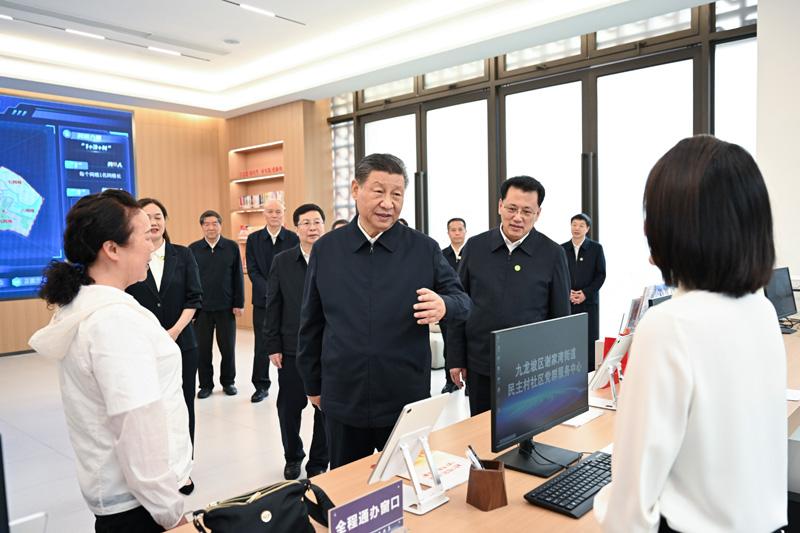
4月22日至24日,中共中央总书记、国家主席、中央军委主席习近平在重庆考察。这是22日下午,习近平在九龙坡区谢家湾街道民主村社区考察。新华社记者 谢环驰 摄
九龙坡区谢家湾街道民主村社区是一个老小区,2022年初启动更新改造项目并纳入全国有关试点。习近平来到这里,察看小区改造和便民服务情况,听取提升基层治理效能、为基层减负情况介绍。他还走进社区食堂,同正在就餐的群众亲切交流,鼓励社区食堂实现可持续发展。习近平指出,老旧小区改造是城市更新的一个重点,也是一项民生工程,既要保留历史记忆和特色风貌,又要解决居民关切的实际问题。要总结推广这方面的成功经验,更好惠及广大社区居民。城市治理的很多工作要靠基层党组织这个战斗堡垒和社区这个平台去落实,要厘清城市社区职责事项,继续推动资源下沉、完善服务设施,强化网格化管理、信息化支撑,提高社区精细化治理、精准化服务水平。
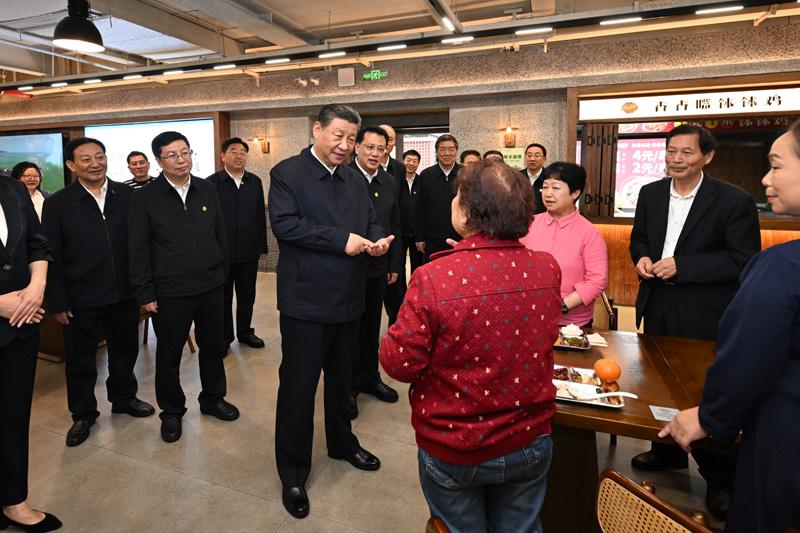
4月22日至24日,中共中央总书记、国家主席、中央军委主席习近平在重庆考察。这是22日下午,习近平在九龙坡区谢家湾街道民主村社区考察时,同正在社区食堂就餐的群众亲切交流。新华社记者 谢环驰 摄
离开时,社区居民纷纷围拢过来欢送总书记。习近平对大家说,中国式现代化,民生为大。党和政府的一切工作,都是为了老百姓过上更加幸福的生活。希望各级党委和政府都能为解决民生问题投入更多的财力物力,每年办一些民生实事,不断增强人民群众的获得感幸福感安全感。

4月22日至24日,中共中央总书记、国家主席、中央军委主席习近平在重庆考察。这是22日下午,习近平在九龙坡区谢家湾街道民主村社区考察时,同社区居民亲切交流。新华社记者 鞠鹏 摄
23日上午,习近平考察了重庆市数字化城市运行和治理中心,听取当地加快城市数字化转型、探索超大城市治理新路等情况汇报,观看系统应用演示。习近平指出,治理体系和治理能力现代化是中国式现代化的应有之义。强化数字赋能、推进城市治理现代化,要科学规划建设大数据平台和网络系统,强化联合指挥和各方协同,切实提高执行力。城市治理涉及方方面面,首要的是以“时时放心不下”的责任感,做好预案、精准管控、快速反应,有效处置各类事态,确保城市安全有序运行。希望你们不断探索,积累新的经验。

4月22日至24日,中共中央总书记、国家主席、中央军委主席习近平在重庆考察。这是23日上午,习近平在重庆市数字化城市运行和治理中心考察。新华社记者 谢环驰 摄
24日上午,习近平听取了重庆市委和市政府工作汇报,对重庆各项工作取得的成绩给予肯定。
习近平指出,重庆制造业基础较好,科教人才资源丰富,要着力构建以先进制造业为骨干的现代化产业体系。深入实施制造业重大技术改造升级和大规模设备更新工程,加快传统产业转型升级,积极培育具有国际先进水平和竞争力的战略性新兴产业。加强重大科技攻关,强化科技创新和产业创新深度融合,积极培育新业态新模式新动能,因地制宜发展新质生产力。积极推进成渝地区双城经济圈建设,更好发挥全国高质量发展的重要增长极和新的动力源作用。大力推动绿色发展,建设美丽重庆,筑牢长江上游重要生态屏障。

4月22日至24日,中共中央总书记、国家主席、中央军委主席习近平在重庆考察。这是22日下午,习近平参观重庆科技创新和产业发展成果展示。新华社记者 王晔 摄
习近平强调,重庆要以敢为人先的勇气,全面深化改革,扩大高水平对外开放。坚持和落实“两个毫不动摇”,一手抓深化国企改革、培育一批核心竞争力强的国有企业,一手抓促进民营经济发展壮大、激发各类经营主体活力。积极融入全国统一大市场建设,主动融入和服务国家重大战略,在推动共建“一带一路”、长江经济带、西部陆海新通道联动发展中发挥更大作用。主动对接高标准国际经贸规则,营造市场化法治化国际化一流营商环境。
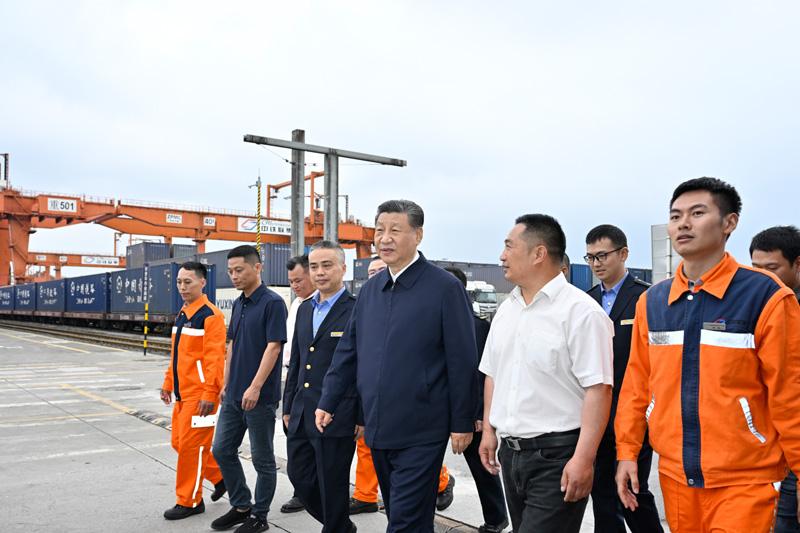
4月22日至24日,中共中央总书记、国家主席、中央军委主席习近平在重庆考察。这是22日下午,习近平在重庆国际物流枢纽园区重庆铁路集装箱中心站,同货车司机、列车司机、装卸工人、场站管理人员等亲切交流。新华社记者 岳月伟 摄
习近平指出,重庆是我国辖区面积和人口规模最大的城市,要深入践行人民城市理念,积极探索超大城市现代化治理新路子。加快智慧城市建设步伐,构建城市运行和治理智能中枢,建立健全“大综合一体化”城市综合治理体制机制,让城市治理更智能、更高效、更精准。扎实推进党建引领基层治理,坚持和发展新时代“枫桥经验”,深化城乡精神文明建设,推进移风易俗,提高全社会文明程度。全面推进韧性城市建设,有效提升防灾减灾救灾能力。
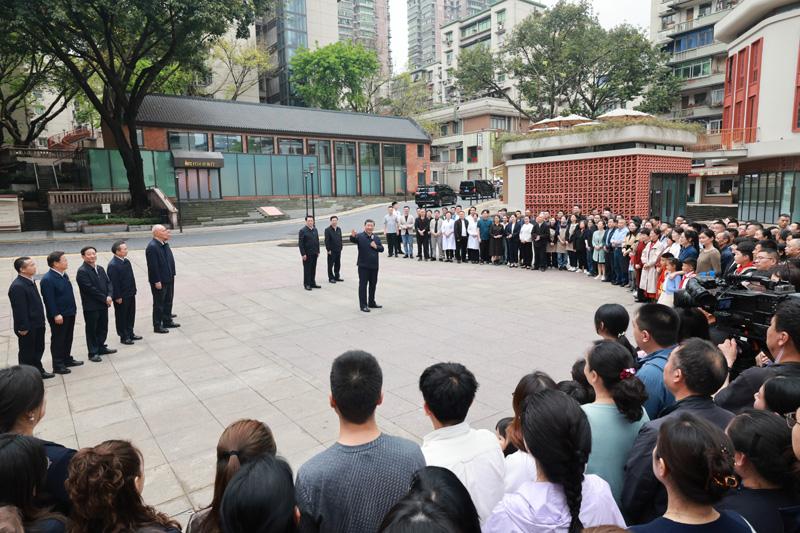
4月22日至24日,中共中央总书记、国家主席、中央军委主席习近平在重庆考察。这是22日下午,习近平在九龙坡区谢家湾街道民主村社区考察时,同社区居民亲切交流。新华社记者 王晔 摄
习近平强调,重庆集大城市、大农村、大山区、大库区于一体,要大力推进城乡融合发展。积极推进以县(区)城为重要载体的新型城镇化建设,有序引导、依法规范城市工商资本和科技、人才下乡,助力乡村全面振兴。抓牢抓实粮食生产,依山就势发展生态特色农业。学好用好“千万工程”经验,因地制宜开展乡村建设,聚焦现阶段农民群众需求强烈、能抓得住、抓几年就能见到成效的重点实事,抓一件成一件,让农民群众可感可及、得到实惠。巩固拓展脱贫攻坚成果,确保不发生规模性返贫。
习近平指出,要毫不放松坚持党的领导、加强党的建设。巩固拓展主题教育成果,建立健全长效机制,推动党员、干部特别是领导干部增强政治能力、提高工作水平,真抓实干、积极进取、担当作为。持续深化整治形式主义为基层减负,为基层干部干事创业创造良好条件。扎实开展党纪学习教育,引导党员、干部真正把纪律规矩转化为政治自觉、思想自觉、行动自觉。一以贯之反对和惩治腐败,不断铲除腐败滋生的土壤和条件,营造风清气正的政治生态。
中共中央政治局常委、中央办公厅主任蔡奇陪同考察。
李干杰、何立峰及中央和国家机关有关部门负责同志陪同考察。
Xi calls on Chongqing to write its chapter in Chinese modernization
BEIJING, April 25 (Xinhua) -- Xi Jinping, Chinese president, general secretary of the Communist Party of China (CPC) Central Committee and chairman of the Central Military Commission, called on Chongqing to give full play to its comparative and late-mover advantages in line with the central tasks of the CPC on the new journey in the new era and its mission entrusted by the CPC Central Committee. The city should further reform and opening up across the board, proactively serve and integrate into the new development paradigm, and strive to promote high-quality development. By doing all these, it should try to build itself into a key strategic fulcrum for the development of China's western region in the new era and a comprehensive hub for inland opening up. The city is also urged to make greater achievements in playing its supporting role in the development of the western region, its leading role in promoting the progress of the Belt and Road Initiative, and its exemplary role in stimulating the green development of the Yangtze River Economic Belt, and thereby continuously write its own chapter in advancing Chinese modernization.
From April 22 to 24, accompanied by Yuan Jiajun, a member of the Political Bureau of the CPC Central Committee and the secretary of the CPC Chongqing Municipal Committee, and Hu Henghua, Chongqing's mayor, Xi inspected a logistics park, a community, the city's digital urban operation and governance center and other places.
On the afternoon of April 22, Xi first inspected the Chongqing International Logistics Hub Park. He came to the control center of the dry port of the New International Land-Sea Trade Corridor of the western region, learning about the construction progress of the corridor. Xi stressed that logistics is the lifeline of real economy. The construction of this corridor is of great significance to promoting the formation of an opening-up pattern featuring "building connections with other countries over land and sea while facilitating mutual assistance between eastern and western regions," he said. All related parties should make concerted efforts to do a good job in building and managing this signature project, so as to advance the high-level opening up in the western and inland regions, Xi said. He also urged logistic parks to actively leverage advanced technologies, continue innovating the multimodal transportation and improve scientific management level, so as to play a greater role in building the modern logistic system.
Later on, Xi came to a rail container hub in Chongqing, where he was briefed on situations of cargo distribution, transport routes, operating costs and returns, and chatted with truck drivers, train drivers, loading workers and management staff. He asked about their work load, labor protection, public holiday leaves and salaries. "You work at the frontline of the logistic sector as well as that of the opening up. Through your hard work, many goods are able to traverse the mountains and seas and enter the international markets," Xi said, stressing the importance of their work. He underscored the significance of logistics in promoting the greater openness and development of the western region, and encouraged workers to continue working hard, achieving new progress and making more contributions.
Xi also heard reports on the progress Chongqing made in promoting the development of the Chengdu-Chongqing economic circle and watched an exhibition on Chongqing's achievements of sci-tech innovation and industrial development. He underlined that building the Chengdu-Chongqing economic circle is a major strategic decision made by the CPC Central Committee. Chongqing and Sichuan should work closely, make consistent efforts to expand development capacity, and jointly strive for better results in building the "two cities" in western China in the new era, Xi noted. He highlighted the role of pillar industries as the main battlefield for developing new quality productive forces. Chongqing's manufacturing sector possesses distinct structural characteristics and corresponding advantages, Xi said, adding that Chongqing should firmly focus on technological innovation, leverage its advantages and strengthen weak links. The city should also do its current work well while planning for the future and persist in promoting the high-quality development of the manufacturing industry in a steady manner.
Minzhu Village Community in Xiejiawan Sub-district, Jiulongpo District, is an old residential area. A renovation project was launched in the community at the beginning of 2022, which has been included in national pilot programs. In the community, Xi learned about the progress of the community renovation and services offered for residents in the community. Xi was briefed on the progress in improving grassroots governance and reducing burden at the grassroots level. He visited the community canteen, where he chatted cordially with people dining there, encouraging the canteen to achieve sustainable development. Xi noted that as a major aspect of the urban renewal, renovation of old residential communities is a project that delivers real benefits to local people. In such renovation, historical structures and unique local characteristics should be preserved while efforts must be made to address practical concerns facing residents. It is important to summarize and promote experience in this regard to deliver more benefits to a larger number of community residents. Xi added that as grassroots Party organizations and communities play a key role in implementing many aspects of work of urban governance, it is necessary to clarify the remit of urban communities, continue to allocate resources down to communities and improve service facilities. Efforts should also be made to strengthen grid-based management and IT support, in a bid to facilitate the level of meticulous community governance and targeted services.
When Xi was leaving, residents of the community gathered to bid farewell to him. Xi told them: "As far as Chinese modernization is concerned, the people's well-being matters the most. All that the Party and government do is for the common people to live a happier life." Xi expressed the hope that Party committees and governments at all levels will invest more financial and material resources in solving problems for people's well-being, and do some practical things to improve people's life every year, so as to continuously enhance people's sense of gain, happiness and security.
On the morning of April 23, Xi visited Chongqing's digital urban operation and governance center, where he was briefed on local efforts to accelerate urban digital transformation and explore new ways for megacity governance, and watched the demonstration of system application. Xi pointed out that the modernization of governance system and capacity is an integral part of Chinese modernization. To strengthen digital empowerment and promote the modernization of urban governance, it is necessary to scientifically plan and build big data platforms and network systems, strengthen joint command and coordination among all parties, and effectively improve execution capacity. Urban governance involves many aspects; the first is to have a strong sense of responsibility to make plans in advance, render management and control accurate and targeted, ensure rapid response, and effectively deal with all kinds of conditions, so as to ensure the safe and orderly operation of the city. Xi hopes them to keep exploring and accumulate new experience.
On the morning of April 24, Xi listened to the report of CPC Chongqing Municipal Committee and Chongqing municipal government on their work, and affirmed what the city has achieved in various aspects of its work.
Xi noted that Chongqing's manufacturing sector has a solid foundation, and its talent resources in science and education is abundant. It is imperative for the city to build a modern industrial system with the advanced manufacturing sector as its backbone. Efforts are required to further promote the major technological transformation and upgrading of the manufacturing sector and the large-scale equipment renewals, speed up transforming and upgrading traditional industries, and foster strategic emerging industries with an advanced global level and competitiveness. It is essential to strengthen efforts to make major technological breakthroughs, integrate innovation in science and technology with that in industries, develop new business forms, models and growth drivers, and develop new quality productive forces according to local conditions. The building of the Chengdu-Chongqing economic circle should be further advanced, and its role as an important growth pole and a new source of power for promoting high-quality development nationwide should be better played. Green development should be further promoted to build a beautiful Chongqing and consolidate the ecological shields along the upper reaches of the Yangtze River.
Xi stressed that Chongqing, with a pioneering and enterprising spirit, should comprehensively deepen reform and expand high-level opening up. It must unswervingly consolidate and develop the public sector and unswervingly encourage, support and guide the development of the non-public sector. On one hand, reform on state-owned enterprises should be deepened, and a batch of state-owned enterprises with strong core competitiveness should be developed. On the other hand, the growth of the private sector should be facilitated, and the vitality of various business entities should be stimulated. Chongqing should proactively integrate itself into the development of a unified national market, take an active part in getting deeply integrated into and serving major national strategies, and play a greater role in promoting the development of the Belt and Road Initiative, the Yangtze River Economic Belt, and the New International Land-Sea Trade Corridor in the western region. Chongqing should also actively dovetail with high-standard international economic and trade rules to develop a first-class market-oriented and law-based international business environment.
Xi noted that Chongqing, as a city with the largest jurisdiction area and population in China, should fully act on the principle that a city should be built by the people and for the people, and actively explore a new path of modernization in megacity governance. It is important for Chongqing to speed up the development of a smart city, build a smart center for city operation and governance, and also establish and improve the "comprehensive and integrated" city governance system and mechanism, so as to make city governance smarter, more efficient and more targeted. It is imperative to guide community-level governance with Party building, adhere to and develop the "Fengqiao Model" in the new era, further cultural and ethical advancement, promote the transformation of outdated rural customs, and make the whole society more civil. It is also a must to promote the building of a resilient city in all aspects and effectively improve its capacity for disaster prevention, mitigation and relief.
Xi stressed that Chongqing should vigorously promote the integrated development of urban and rural areas as it is a megacity with a vast rural and mountainous area, and a reservoir area all in one. Xi called for more efforts to promote new urbanization with focus on county (district) seats, guide and regulate urban industrial and commercial capital, science and technology as well as professionals to serve rural areas in an orderly and law-based manner, so as to promote rural revitalization across the board. More efforts should be made in grain production, and agriculture with ecological characteristics should be developed by making full use of local conditions. It is important to learn from the experience of the Green Rural Revival Program, and promote rural development in light of specific circumstances. Efforts should be focused on important things that can be done with available resources, yield results in a couple of years and meet the urgent needs of villagers. By getting these things done one after another, perceptible and accessible benefits will be made for rural residents. What has been achieved in poverty alleviation should be consolidated and expanded, making sure that no large number of people will slip back into poverty.
Xi pointed out that CPC leadership must be upheld and Party building strengthened. It is imperative to consolidate and expand what has been achieved in the theoretical study program. A long-term mechanism should be established to promote the capability of Party members and officials, especially leading officials, to do political work and improve their competence, so that they will perform their duties in a down-to-earth manner and strive to make contributions. The fight against pointless formalities should be continued to ease burdens on those working at grassroots and create favorable conditions for primary-level officials to do their work well. Solid efforts should be made to carry out study programs on Party disciplines, guiding Party members and officials to truly turn political disciplines and rules into their awareness in political orientation, thinking, and action. Corruption should be consistently fought against and corrupt elements punished, and the breeding grounds and conditions for corruption should be constantly eliminated, in order to keep a clean political environment.
Cai Qi, a member of the Standing Committee of the Political Bureau of the CPC Central Committee and director of the General Office of the CPC Central Committee, accompanied Xi on the inspection tour.
Li Ganjie, He Lifeng and leading officials of relevant central Party and government departments were also on the inspection tour. ■

